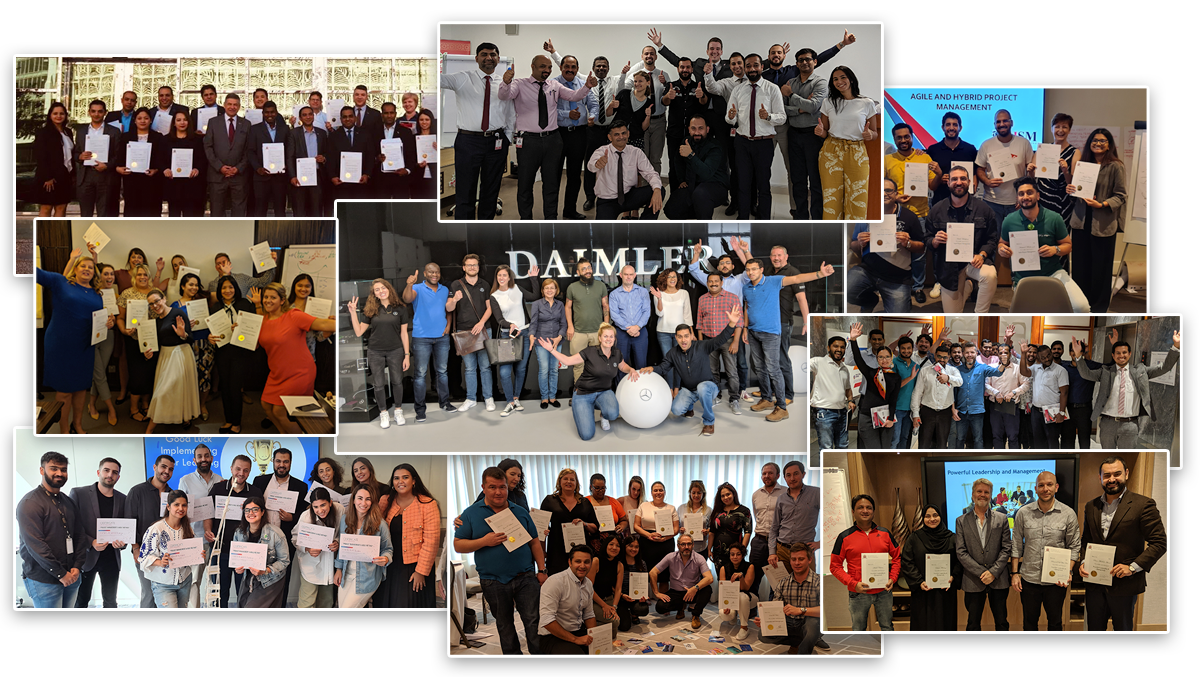Ever felt lost without a plan? Without clear direction, it is easy to waste time, feel overwhelmed, or miss opportunities.
Strategic planning works hand in hand with strategic thinking. It helps individuals and businesses set clear goals, stay organised, and make smarter decisions. It provides a roadmap for success, ensuring that every step moves you closer to your objectives, which is why it is key for leaders.
In 2016, it was estimated that 67% strategies failed because of poor execution. With the right strategy, you can work more efficiently, overcome challenges, and achieve long-term success.
Why Trust ISM Training?
Over 20,000+ graduates
Have advanced their career with ISM Training
89%
of ISM graduates say our course helped them get a promotion.
76%
said that their training helped then increase their salary.
97%
of graduates want to study more of our courses.
Our graduates are working in some of the biggest companies worldwide, companies like...






What is strategic planning?
Strategic planning means making a clear plan to reach a goal. Strategic thinking allows you to come up with great ideas. Strategic planning helps people and businesses stay focused, avoid mistakes, and work smarter.
Planning is useful in many situations:
- At work – organising tasks, managing projects, and meeting deadlines
- In school – preparing for exams, finishing assignments, and balancing activities
- In life – saving money, learning new skills, and making important decisions
With a good plan, you know what to do, when to do it, and how to do it. This makes achieving goals easier and less stressful.
Why is strategic planning important?
Without a plan, things can feel messy and confusing. You might waste time, miss deadlines, or feel overwhelmed. Good planning helps you:
- Use time wisely and stay on track
- Make better decisions instead of guessing
- Stay organised and avoid last-minute stress
- Prepare for challenges and have backup options
Planning ahead saves time and energy while making sure you get things done the right way.
Start your course today!
We offer a comprehensive curriculum that covers all of the essential topics. Our experienced instructors will provide you with the support and guidance that you need to succeed.
Different types of strategic planning
A one-size-fits-all approach to strategic planning does not exist.
Here are eight powerful methods businesses use to create winning strategies.
SWOT Analysis
SWOT stands for Strengths, Weaknesses, Opportunities, and Threats.
It helps businesses look at both internal and external factors to understand their current position and future potential.
Pros: Easy to do, cost-effective, and provides valuable insights.
Cons: Can be influenced by opinions and may not be detailed enough for complex planning.
PEST Model
PEST stands for Political, Economic, Social, and Technological factors.
It helps businesses analyse external conditions, especially when entering a new market.
Pros: Helps businesses understand their market environment.
Cons: Only looks at external factors and ignores internal ones. Works best when combined with other methods.
OKRs (Objectives and Key Results)
OKRs help businesses set clear strategic goals and measure success.
Companies like Google use this method to stay focused.
Pros: Simple and effective, it helps team members see how their work contributes to success.
Cons: Too many strategic objectives can cause confusion and lack of focus.
Porter’s Five Forces
This method helps businesses understand competition and market conditions by analysing five key factors:
- Competitors in the industry
- New companies entering the market
- Supplier power
- Customer power
- The threat of substitute products or services
Pros: Helps businesses find growth opportunities and improve strategies.
Cons: Does not cover all external factors like technology changes or new regulations.
VRIO Framework
VRIO stands for Value, Rarity, Imitability, and Organisation.
It helps businesses understand what makes them unique and how they can use their resources effectively.
Pros: Helps companies focus on their unique strengths.
Cons: Smaller companies may struggle to use this method. It ignores the external environment.
Gap Planning
Gap Planning (or Gap Analysis) helps businesses identify where they are now and where they want to be. The four steps are:
- Analyse the current situation
- Define the ideal future state
- Identify the gap and possible solutions
- Create a strategic plan and apply it
Pros:Provides a clear roadmap for improvement.
Cons: Can be expensive and time-consuming, often requiring outside experts.
Balanced Scorecard (BSC)
This method helps businesses track progress and align daily work with long-term goals.
It looks at four key areas:
- Financial performance – How well the company uses money
- Customer satisfaction – How customers view the company
- Internal processes – How efficiently the company operates
- Resources & Growth – Things like employee skills, company culture, and technology
Pros: Helps businesses stay focused and connected to their goals.
Cons: Requires a lot of data and can get complicated.
Blue Ocean Strategy
This strategy helps businesses create new markets instead of competing in crowded ones. Nintendo used this to develop the Wii and DS, targeting people who never played video games before.
Pros: Creates new opportunities with no competition.
Cons: High risk—success depends on timing and the right idea.
We let our graduates do the talking...
How to develop strategic planning skills
Improving your strategic planning skills will help you flourish not just in the business environment, but also in the real world.
By implementing the strategies below, you will improve your ability to make informed decisions.
Set a clear goal
Every plan starts with a goal. What do you want to achieve? Make sure your goal is:
- Specific – Be clear about what you want
- Realistic – Make sure it’s something you can do
- Time-based – Set a deadline
Example: Instead of saying, “I want to get better at my job,” say, “I will complete an online course on leadership in three months.”
Create a step-by-step plan
A goal is easier to reach when you break it into smaller steps. Think about:
- What needs to be done first?
- Who can help?
- What resources do you need?
Example: If your goal is to improve your fitness, your steps might be:
- Choose a workout plan
- Set a schedule (exercise 3 times a week)
- Track progress and adjust if needed
A simple, clear plan helps you stay on track without feeling overwhelmed.
Manage your time well
Good planners know how to use time wisely. If you wait until the last minute, you might feel rushed and make mistakes.
Try this:
- Use a calendar or to-do list to stay organized
- Set reminders for important deadlines
- Work on tasks in small steps instead of all at once
Planning your time means you will not have to rush or feel stressed.
Be ready for challenges
Not everything goes as planned, but a good planner thinks ahead and has a backup plan.
Example: If you are planning a work presentation and your laptop stops working, what is your backup? Printing notes or saving a copy online could save the day.
Always ask yourself:
- What could go wrong?
- How can I fix it?
Being prepared helps you handle problems calmly and effectively.
Monitor progress
A good plan is not something you just implement and forget about. Check your progress and make changes if needed.
Ask yourself:
- Am I on track to reach my goal?
- Do I need to adjust my plan?
- What have I learned so far?
If something is not working, do not give up—adjust your approach and keep going!
Planning for success
Strategic planning is useful for work, school, and personal life. People who plan ahead are more successful because they make smart choices and stay focused.
Try this: Think of a goal you want to achieve. Decide on 3-5 steps to reach it, and start working on it today!
Looking further ahead?
View our course calendar in full
Enhance your success with strategic planning training
Good planning helps you stay organised, avoid stress and achieve success. No matter if you are working, studying for a test, or making an important decision, having a plan helps!
Strategic planning is not only for executives. It is a valuable skill for anyone who wants to succeed in their career and personal life.
ISM Dubai offers a specialised training program designed to sharpen your strategic thinking and planning abilities. This hands-on course provides proven techniques to improve strategic planning and decision-making. It will boost your efficiency and help you navigate future challenges with confidence.
Since 1998, ISM Dubai has been a leader in corporate training, helping professionals across the UAE develop and execute effective strategies for long-term success.
Elevate your leadership and problem-solving skills — contact us today to enrol in ISM Dubai’s Strategic Planning Workshop today.
Frequently Asked Questions
Strategic planning is the process of setting clear goals and creating a roadmap to achieve them.
It helps individuals and businesses stay organised, make better decisions, and work efficiently.
A business plan shows a company’s goals, operations, financial forecasts, and structure. It focuses on how the business will operate.
A strategic plan focuses on long-term goals, competitive positioning, and the steps needed for lasting growth and success.
Popular methods include SWOT Analysis, OKRs, Balanced Scorecard, and Blue Ocean Strategy.
Each approach helps businesses analyse their strengths, competition, and market opportunities.
SWOT analysis is important for strategic planning. It helps find strengths, weaknesses, opportunities, and threats. This gives a clear view of the current situation.
This insight enables better decision-making, risk management, and the development of effective strategies.
You can monitor a strategic plan by:
- setting clear performance metrics
- tracking progress regularly
- adjusting the plan as needed
Regular reviews, feedback, and analysing data help ensure alignment with goals and improve outcomes.
Join 1000's of individuals and teams certified by the Institute of Sales & Marketing

Our trending courses
At ISM, we combine top-tier training courses with industry-leading instructors.
View all coursesTestimonials from Our Valued Clients
Discover the transformative experiences our clients have had with our training programs.
Hear directly from those who have unlocked their potential and achieved remarkable success.

Some other providers courses can be quite a chore! However, I felt fully engaged and excited by all the new selling tools I have...

Daniel Graham

Instead of just telling me what to do, they showed us how to do it as well as why to do it. They used real-life experiences...

Sujit Nair

The training was delivered in an easy to absorb manner and focused on all the key areas...

Paul Baker CFP



